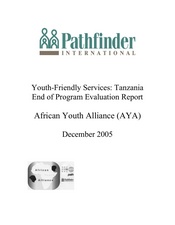AYA Final institutional-capacity-building Reports
Youth-Friendly Services: Tanzania End of Program Evaluation Report
AYA - Final Adolescent Reproductive Health Reports - Tanzania
Youth-Friendly Services: Uganda End of Program Evaluation Report
AYA - Final Adolescent Reproductive Health Reports - Uganda
Youth-Friendly Services: Botswana End of Program Evaluation Report
AYA - Final Adolescent Reproductive Health Reports - Botswana
Youth-Friendly Services: Ghana End of Program Evaluation Report
AYA - Final Adolescent Reproductive Health Reports - Ghana
Related Publications
Providing Reproductive Health Services to Young Married Women and First-time Parents in West Africa: A Supplemental Training Module for Facility-based Health Care Providers
Young married women and first-time parents (FTPs) face a unique set of challenges to living healthy sexual and reproductive lives. This training aims to give health care providers the knowledge and skills they need to meet the needs of these groups. This training is designed for use in francophone West Africa, where a significant proportion of adolescent girls aged 15–19 and young women aged 20–24 are married or living in union, but it can easily be adapted for other settings.
Meeting the Needs of Young Married Women and First-time Parents
Young married women and first-time parents (FTPs) face a unique set of challenges to living healthy sexual and reproductive lives. This series of trainings aim to give health care providers, community workers, and small group facilitators the knowledge and skills they need to meet the needs of these groups.




